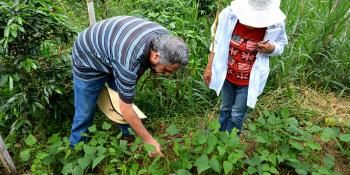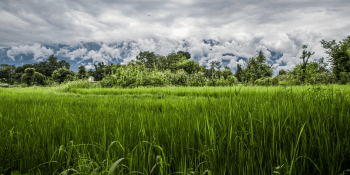Connecting the dots: youths, climate adaptation and indigenous knowledge

by Maxwell Mkondiwa, reporting from the 6th Community Based Adaptation Conference in Vietnam
What is a community? Practitioners often implemented "community" development projects based on their perception of a community or village as a unified unit consisting of various individuals who share various common resources and institutions. However, this concept of community was challenged during the Sixth International Conference on Community Based Adaptation (CBA6) held in Hanoi, Vietnam from 16th to 22nd April 2012 as participants called for realistic assumptions when reporting the achievements of various adaptation projects. Participants acknowledged that while we need simple ways to consider community-based adaptation to climate change, we also need to understand the power relations, statuses and structure within communities. Thus a disaggregation of this so called “community” is necessary. While a community may also entail a community of practice, indigenous communities should also be understood as a special case in all CBA work.
The conference included a session on Vulnerable and Indigenous Communities. It was generally reiterated that indigenous communities are not fully involved in the design, implementation, monitoring and evaluation of various CBA activities organizations are implementing. The participants recognized the challenge of working within power systems where indigenous knowledge is subdued, but is absolutely essential in allowing communities to survive unimaginable changes in climate. The nexus between indigenous knowledge, youths and climate change was underscored to be difficult to study considering the rapid IK erosion among the youths as they advance in education, migrate, and intermingle with knowledge trends. There are various questions we need ponder when looking at the nexus between climate change adaptation, indigenous knowledge and youths which needs to be addressed if any CBA work is bear fruits.
The first question is whether indigenous knowledge (IK) is worth studying or tapping into. Critics of IK have argued that IK is no longer credible in this uncertain world and that it is primitive for any meaningful adaptation to climate change. While it is true that the world is becoming more unpredictable, it should also be noted that science has not yet provided all the solutions either. In the context of developing countries, scholars have argued that researchers and scientists are yet to reorient their knowledge with reality. While they are busy analysing climate data using 30-50 year time scales, farmers are actually making decisions on their farming each day, week, month and season. And indeed while scientists are busy focusing on meteorological droughts, farmers have their eyes on the agronomic droughts (Ovuka and Lindquist, 2000 and Slegers, 2008). The other reality for developing countries is that longitudinal climate data is sparse and potentially unreliable. With little evidence and sparse meteorological data locally on many facets of climate science, often peoples' own experiences are more reliable and valid.
The other difficult question is why should we take a youth perspective when it is already known that IK resides in the old minds of the community members and that household, community and national decision making is in the hands of the grownups. Using Africa as an interesting case, we know that more than 60% of the population in most African countries are youths. Yet they face the highest unemployment rates. Young people are a huge demographic dividend that would both help in building up the adaptive capacities of the communities as well provide solutions for climate change adaptation. We may actually be missing out on opportunities accrued to the youthful generation!
When doing research that combines both climate science, youths knowledge and IK, the first challenge is whether we have proper tools for studying this. My take is that we have the tools that we allow ourselvs to use within our comfort zones as researchers. A simple case is where we specifically indicate in our research protocols that the respondents should either be household heads or an elderly person within a household and that workshops should be attended by those who are elderly. This already leaves out the youths in the whole research agenda. Moreover, a researcher's own age and experience is often considered more important than the potential to creatively provide solutions. In the context of statistical climatic data analysis, we have relied too heavily on meteorological data which is unfortunately not reliable or not available for most developing countries. In addition, our analysis has relied only on the frequentist statistics while neglecting the Bayesian Methods which have potential to capture various knowledge sources.
During the field trip to Cho Moi District during the CBA6, an interesting case on the nexus between indigenous knowledge, youths and climate change adaptation was observed as youths were seen making videos of a field farmer school in which farmers practicing System of Rice Intensification (SRI) were showcasing their own designed experiment to other farmers who had been using unproductive methods.
It is thus time to start considering a youth-centred CBA approach. A number of methods are already available. Community Foresight Analysis, which allows for collective sharing and learning of experiences among the elderly and the youths for the future; participatory action oriented research, in which research is done over years with iterative implementation of findings; Bayesian Methods in which IK estimates are used as priors in the climatic models; Community Analogues for CBA work (instead of climate analogues) based on credible evidence and contextual understanding; and IK based or locally accepted ways of communication systems blended with new tools/technologies. I feel it’s time to connect the bits we have willingly kept apart, and move away from our comfort zones to link the unlinked and imagine the unimaginable.
Maxwell Mkondiwa is a Research Fellow (intern) at the Center for Agricultural Research and Development (CARD) at the University of Malawi and a CCAFS Delegate at the CBA6. Read more stories from the Community Based Adaptation conference and follow us on twitter @cgiarclimate and the CCAFS facebook page for more updates


